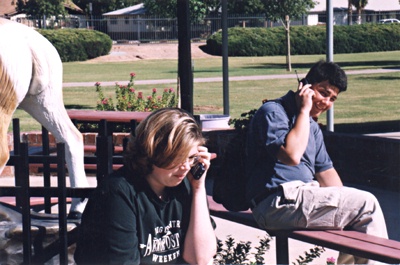All Nonfiction
- Bullying
- Books
- Academic
- Author Interviews
- Celebrity interviews
- College Articles
- College Essays
- Educator of the Year
- Heroes
- Interviews
- Memoir
- Personal Experience
- Sports
- Travel & Culture
All Opinions
- Bullying
- Current Events / Politics
- Discrimination
- Drugs / Alcohol / Smoking
- Entertainment / Celebrities
- Environment
- Love / Relationships
- Movies / Music / TV
- Pop Culture / Trends
- School / College
- Social Issues / Civics
- Spirituality / Religion
- Sports / Hobbies
All Hot Topics
- Bullying
- Community Service
- Environment
- Health
- Letters to the Editor
- Pride & Prejudice
- What Matters
- Back
Summer Guide
- Program Links
- Program Reviews
- Back
College Guide
- College Links
- College Reviews
- College Essays
- College Articles
- Back
A New Age: Social Media and How it Will Change the Relationship
Since the formation of the computer (and, more specifically, the internet), it has only been natural for social media to begin to germinate and root itself into our society. After all, we are a species that has always thrived on our ability to interact. It is how we’ve survived. But with an evolving society, how we socialize has changed. In this case, into social media sites. Social networking began as a way to connect with new and old bonds; instead, it has been replaced by virtual ones quite different from the old relationships created before the age of technology. With the newly heightened knowledge of exactly where one ranks, the now harder task of not ignoring those around us, and the overly apparent use of a lot of “friends” versus a few real relationships, leading to losing what we all truthfully want, it makes one question whether it truly is smart to use these sites, especially by our society’s youth.
Social media sites, after all, target those that are often constantly worried about how they’re perceived by the world. With social networking it’s easier to be now consumed by the need to be on the right ranks, socially, as analyzed in “Just How Many Facebook Friends Do You Need?” by Robin Marantz Henig and her daughter, Samantha Henig. They argue that social networking “adds a new layer of angst to a young person’s already-heightened awareness of social ranking, giving appearance-conscious young people yet another thing to fret about” (Henig and Henig 1). With this now easily reachable knowledge, it can make some obsessed about their image. Some might even start to wonder if the tangible relationships they have are real at all. This can mean negative effects on the relationships we have in the world around us.
And, with a feeling that we need to get up higher in social ranking, it can lead to a “Fear of Missing Out”, or “FOMO” for short, as Henig and Henig call it. FOMO might mean worrying about the could have been rather than the right now. Furthermore, “it’s because of FOMO that 20-somethings are so focused on their smartphone screens, so preoccupied that they forget to be with the friends they already have” (Henig and Henig 2). Social media allows us to stay informed about our friends doings. But, if we know this, it can mean leaving us wanting something that we can’t have, spending our time on yearning rather than doing what we can, being with the friends in front of us.
Ignoring friends that we have to be with our 500 other “friends” can lead to problems on the few friendships that actually are friendships. These few, if actually kept, can lead to what we really need. Since what “young people should [actually] fear is missing out on those few, true, long-term friendships that make for a richer, happier life” (Henig and Henig 3). Small groups that include the ones people really want to be with is going to naturally give people what they naturally want: a community relationship that is clearly perceptible. Virtual relationships can lead to a devaluing of this, and mean a large, non-community of five hundred “friends”.
The definition of a relationship is changing as our life becomes more virtual. New knowledge of social standing, the fear of missing out, and too many “relationships” not being able to take the presence of a few is going to affect that definition. Just as any age has, whether it be the Dark Ages or the Age of Enlightenment, the Age of Information is changing our world. And we’re living in that change. The dynamics of relationships are coming with and how they end up on the other side will be completely different from how even our parents have ever experienced them.

Similar Articles
JOIN THE DISCUSSION
This article has 0 comments.
